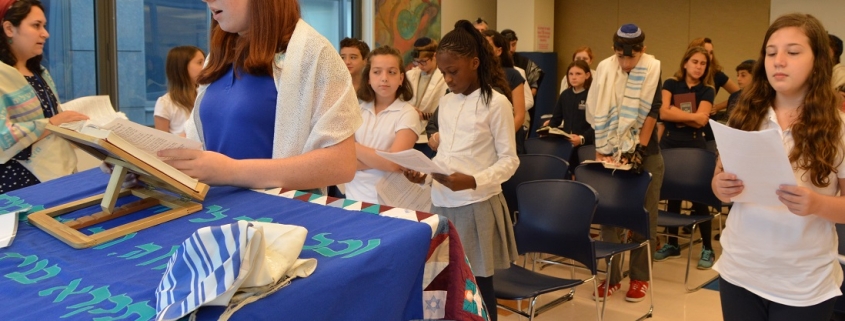07 Oct Teshuva, Tefilah, and Tzedakah – תשובה ותפילה וצדקה
The centerpiece of the high holiday liturgy is the unetane tokef prayer added to the musaf amidah on Rosh Hashanah and Yom Kippur. The prayer describes God, sitting in judgement over all creation, determining the outcome of our lives. At the apex of the drama we recite the line ותשובה ותפילה וצדקה מעבירין את רע הגזרה- “Repentance (teshuva), prayer (tefilah), and charity (tzedakah) annul the severity of the decree.” These are the things we can do in our lives to make a positive difference, for ourselves and those around us.
Teshuva, tefilah, and tzedakah are not things that necessarily come easily. They each need to be learned and take practice to do in meaningful ways. At Schechter Manhattan we work with our students to help them build the skills and dispositions needed to participate in teshuva, tefilah, and tzedakah.
Teshuva is a process of self reflection. It requires looking inward to think carefully and honestly on what we have done well and what challenges we are facing. Students at Schechter Manhattan are asked to practice self reflection throughout their school lives. In the upper elementary and middle school grades they develop portfolios of their work, reflecting on each piece they select and what they can learn about themselves from it. They identify areas they are proud of and areas that they want to work to improve. This practice of self reflection in their academic lives builds key skills and comfort for the harder work of cheshbon hanefesh, taking stock of our personal lives. Each year during the 8th grade graduation exhibitions, I am always struck by the students’ honest expressions of who they are and who they aspire to be. Our graduates understand that self improvement is an ongoing and never ending process.
Tefilah is hard. It requires focus and commitment, understanding and openness. At Schechter Manhattan we aspire for our students to make personal meaning, develop skills, and feel a part of community through the regular practice of tefilah. Students are asked to both make meaning of the words of the siddur, traditional prayerbook, through lessons and discussions about each new prayer they learn, and to add their thoughts and feelings to the pages of the siddur they create throughout elementary school. They develop skills to read and recite the prayers, using traditional melodies, through daily practice and coaching from teachers, and they all take turns in leadership roles, building the skills to be facile shlichei tzibur, service leaders. The very act of praying together and learning about prayer together helps our students to come together in authentic Jewish community each day. It is among my weekly highlights to have the opportunity to join our students in tefilah.
Tzedakah is an expression of our commitment to helping others. At Schechter Manhattan we collect tzedakah throughout the year, each Friday as part of our kabbalat shabbat. Students practice the experience of placing some change in a tzedakah box and come to see the act as a routine part of their lives. In the late winter we work in partnership with the Parents’ Association to run our yearly Tzedakah Roundtable. Students are asked to talk with their parents about a selection of worthy charitable organizations and consider together what criteria they might use to decide where to give. Then, each grade comes together in school to discuss and debate their giving choices. The tzedakah roundtable discussions are always rich and nuanced, and I am always pleased and impressed by the students’ thoughtfulness.
As we begin 5777, I pray that we and our students have a year filled with teshuva, tefilah, and tzedakah. And that these meaningful Jewish actions will bring blessings to our lives and to the world.
Gmar chatima tova
![]()
Benjamin Mann
Author’s Chair
Each week we will feature the written work of our students. We hope that you will stop by every week and see what they are writing and thinking about.
Gan
Every Monday (or day after a vacation), the Gan students write about their weekends in an assignment called “Weekend Update.” Here are a couple examples from this week:
PLADit EZRO LUESO UDEN NEVO (Playdate Ezra Louisa Yadin Neva)
–Emilia
I HAD LNH I GROV EACR (I had lunch I drove a car)
–Adele
I WAT TO MY ACL HS (I went to my uncle’s house)
–Judah
Kitah Bet
Kitah Bet has been learning about Rosh Hashanah and the New Year being an opportunity for “second chances.” Students were asked to write complete sentences using the following prompts: “This year I want a second chance to…” and “I will try to…” They focused their answers on describing their personal classroom goals for the year.
Click here to read work by Tsofia, Natan, Yonah, and Orli
Kitah Dalet
Kitah Dalet has been working on ways to deepen their understanding of the books they are reading. They have been writing questions they have about the books. The questions include text-to text and text-to self connections they have with the book. Here are some examples.
Click here to read work by Talia, Annabelle, Yonatan, and Rafi
Kitah Vav
After learning about poleis, or city-states in Ancient Greece, students created presentations about their assigned polis.
Click here to read work by Sarah, PJ, and Alon.



